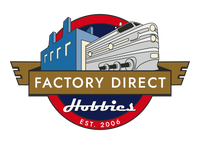Return & Refund Policy
Effective October 1, 2025
Factory Direct Hobbies has a 30-day return policy, which means you have 30 days after your item has shipped to request a return.
To be eligible for a return, your item must be in the same condition that you received it and in its original packaging. All manuals, parts, and accessories must be included.
To start a return, visit our Returns Center. If your return is approved, we'll email you instructions on how and where to send your package. Items sent back to us without first requesting a return will not be accepted and will be returned to sender.
Defective or Damaged Items
- If your product is defective, damaged, or we made an error, you can return it at no cost.
- Whenever possible, defective items are routed directly to the distributor for credit. If that’s not an option, items may be returned to Arden as a fallback.
- Refunds are issued to your original payment method. If the original method is unavailable, store credit will be issued. After six months, only store credit is available.
Returns Due to Ordering Mistakes
This applies to incorrect scale, color, size, or duplicate orders:
- Store Credit: 10% restocking fee, customer responsible for returning shipping.
- Refund to Original Payment: 15% restocking fee, customer responsible for returning shipping.
- Our Error Exception: If FDH shipped the wrong item, no restocking fee or return shipping charge applies.
Loose Track, Components, O Scale, and Special Orders
Returns of loose track, small components, O scale items, and special-order items incur a 15% restocking fee. Return shipping is deducted whether you choose store credit or a refund.
Damages and Issues
Please inspect your order upon receipt and contact us immediately if the item is defective, damaged, or if you receive the wrong item, so we can evaluate the issue and make it right.
Exceptions / Non-Returnable Items
- Gift cards and digital/downloadable products
- Items marked final sale, clearance, or otherwise non-returnable on the product page
- Items that have been used, modified, or are missing parts, manuals, or original packaging
- Some manufacturers handle warranty issues directly. If that applies, we’ll help you contact them
Exchanges
The fastest way to ensure you get what you want is to return the item you have and place a new order for the replacement on our website. Please note that we cannot process manual exchanges over the phone.
Refunds and Processing Time
We will notify you once we’ve received and inspected your return, and let you know if the refund was approved.
- Approved refunds are issued within 7–10 business days.
- Refunds go to your original payment method when possible. In some cases, store credit may be issued instead.
- Your bank or card issuer may take additional time to process and post the refund.
Orders Placed Before October 1, 2025
Orders placed before this date follow the previous return policy.
Need Help?
If you have questions about a return or warranty, please contact our support team and include your order number so we can assist you quickly.



